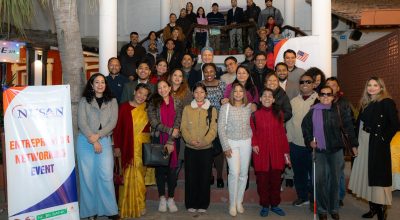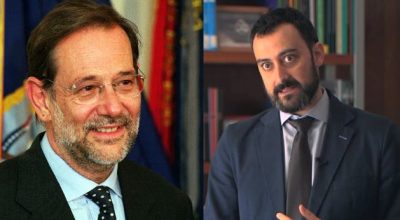
PARIS – I was fortunate to participate in the recent AI Action Summit in Paris, where many discussions emphasized the need to steer AI in a more socially beneficial direction. At a time of increasingly loud calls for AI acceleration from Silicon Valley – and now from the US government – the opportunity to focus on what we want from the technology was like a breath of fresh air.
As I noted in one of my speeches, we should start by asking what is valuable and worth amplifying in human societies. What makes us so special, or at least successful in evolutionary terms, is our ability to devise solutions to problems large and small, to try new things, and to find meaning in such efforts. We have a capacity not only to create knowledge, but also to share it. Though the human journey has not always been smooth – our capabilities, machines, and knowledge sometimes cause profound harms – constant inquiry and prolific sharing of information is essential to what we are.
For more than 200,000 years, technology has been central to this story. From the days of stone tools to the present, we have built the solutions to our challenges; and from oral storytelling and the invention of writing to the printing press and the internet, we have developed new and better ways of sharing knowledge. Within the past 200 years, we have also figured out how to experiment better and more freely, and we have communicated this knowledge, too. The scientific process gave us established facts, allowing each generation to build on its predecessors’ advances.
It also underpinned spectacular growth in most countries over the past two centuries. While economic development has created tremendous inequality between and within countries, people almost everywhere today are healthier and more prosperous than they would have been in the eighteenth century. AI could invigorate this trend by complementing human skills, talents, and knowledge, improving our decision-making, experimentation, and applications of useful knowledge.
Some may question whether we need AI for this purpose. After all, we already live in an age of information abundance; everything one might want – and much that one does not want – is technically accessible through the internet. But useful information is scarce. Good luck finding what you need to address a specific problem in a particular context, in a timely fashion.
It is relevant practical knowledge, not mere information, that makes factory workers more productive; enables electricians to handle new equipment and perform more sophisticated tasks; helps nurses play a more critical decision-making role in health care; and generally allows workers of all skills and backgrounds to fill new and more productive roles.
AI, properly developed and used, can indeed make us better – not just by providing “a bicycle for the mind,” but by truly expanding our ability to think and act with greater understanding, independent of coercion or manipulation.
Yet owing to its profound potential, AI also represents one of the gravest threats that humanity has ever faced. The risk is not only (or even mainly) that superintelligent machines will someday rule over us; it is that AI will undermine our ability to learn, experiment, share knowledge, and derive meaning from our activities. AI will greatly diminish us if it ceaselessly eliminates tasks and jobs; overcentralizes information and discourages human inquiry and experiential learning; empowers a few companies to rule over our lives; and creates a two-tier society with vast inequalities and status differences. It may even destroy democracy and human civilization as we know it.
I fear this is the direction we are heading in. But nothing is preordained. We can devise better ways to govern our societies, and choose a direction for technology that boosts knowledge acquisition and maximizes human flourishing. We can also ensure that AI creates more good jobs and enhanced capabilities for everyone – regardless of their education and income level.
But first, the public must recognize that this socially desirable path is technically feasible. AI will move in a pro-human direction only if technologists, engineers, and executives work together with democratic institutions, and if developers in the United States, Europe, and China listen to the five billion people who live in other parts of the world. We desperately need more thoughtful advice from experts and inspiring leadership from politicians, whose focus should be on incentivizing pro-human AI through policy and regulatory frameworks.
But we also need more than regulation. One hopes that European AI companies and researchers can show that there are alternatives to the Silicon Valley model. To achieve this demonstration effect, European society must encourage the more socially beneficial direction of AI and European leaders will need to invest in the necessary digital infrastructure, design regulations that do not discourage investment or drive away talented AI researchers, and create the kind of financing mechanisms that successful startups need to scale up. Without a robust AI industry of its own, Europe will have little to no influence on the direction of AI globally.
Daron Acemoglu, a 2024 Nobel laureate in economics and Institute Professor of Economics at MIT, is a co-author (with Simon Johnson) of Power and Progress: Our Thousand-Year Struggle Over Technology and Prosperity (PublicAffairs, 2023).
Copyright: Project Syndicate, 2025.
www.project-syndicate.org
















